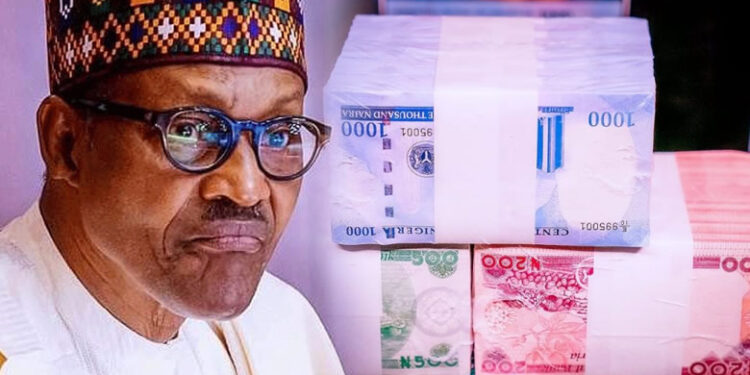7 February 2023
A High Court of the Federal Capital Territory has restrained the President, Muhammadu Buhari, CBN Governor, Godwin Emefiele and 27 commercial banks from suspending, stopping, extending or interfering with the currency swap terminal date fixed for the 10tTH of February 2023..
The order was handed down by Justice E. Enenche on Monday following an application by four political parties.
That said, the three governors, Nasir El-Rufai of Kaduna, Yahaya Bello (Kogi) and Bello Matawalle (Zamfara) who dragged the CBN and the Federal Government to the Supreme Court, were seeking a halt to the full implementation of the naira redesign policy initiated by the apex bank.
No date has been fixed for the hearing of the suit which is coming four days after the governors elected on the platform of the All Progressives Congress met with the President where they complained about the hardship occasioned by the currency policy.
Buhari had asked them to give him seven days to address their complaints, but apparently unimpressed by the President’s pledge, the governors on Monday headed for the Supreme Court to stop the policy.
The applicants in the suit were the Attorneys-General and Commissioners of Justice of Kaduna, Kogi and Zamfara, while the Attorney-General of the Federation and Minister of Justice, Abubakar Malami, SAN, was the sole respondent in the matter.
At a briefing held in Lagos earlier on, the CBN governor had maintained that the apex bank would not extend the deadline for swapping old naira notes with the newly redesigned ones, stating that the CBN and other stakeholders were already addressing areas where there were pressures.
Some prominent Nigerians, including Edo State Governor Godwin Obaseki, the Peoples Democratic Party presidential candidate, Atiku Abubakar, and his Labour Party counterpart, Peter Obi, Senator Ben Bruce and Accord Party Chairman, Mohammed Nalado supported the CBN policy.
Obaseki endorsed the policy in a post on his official Twitter handle on Monday while Atiku and Obi had argued in separate statements and a Twitter post that the merits of the new naira policy far outweighed the inconveniences Nigerians were experiencing.
But on Sunday, the Governor of Yobe State, Mai Mala Buni, lamented that people in the rural areas in the state were finding it difficult to get the new naira notes
In a Facebook post, he said, “I have ordered the opening of branches of the state-owned microfinance bank in the 17 local government areas of the state to enable the citizens to have access to financial services. As a government, it is our responsibility to look into all possible solutions to help our citizens access financial services. To achieve this, I have directed that the state-owned Yobe Microfinance Bank opens branches in each of the state’s 17 local governments.”
On his part, the Minister of Works and Housing, Babatunde Fashola who was a guest on the Channels Television programme ‘Politics Today’ on Monday, asked for the adjustment the policy while he empathised with Nigerians over the hardship being experienced in obtaining the new naira notes across the country.
According to him, those who initiated the policy should reflect on it and ask themselves whether that was the intent of the policy to cause people pain, advising that the policy should be readjusted.
However, while asserting the rights of the citizens to reasonable notice, the three governors averred that the 10-day extension by the FG was largely insufficient to address the challenges occasioned by the policy adding that “there is no justifiable basis for the ongoing difficulties.”
The three northern states in a motion ex-parte filed on their behalf by their lawyer, Abdul-Hakeem Mustapha, SAN, urged the apex court to grant “an order of interim injunction restraining the Federal Government of Nigeria, either by itself or acting through the Central Bank Nigeria and/ or the commercial banks; its agents; agencies; corporations; ministries; parastatals; organizations or through any person or persons (natural and artificial) howsoever, from suspending or determining or ending on the 10th of February 2023 the timeframe within which the now older versions of the 200, 500 and 1000 denominations of the naira may no longer be legal tender pending the hearing and determination of the plaintiffs/Applicants’ Motion on Notice for interlocutory injunction.”
The plaintiffs also filed a motion on notice to abridge the time within which the respondent may file and serve his counter-affidavit to the suit and an order for an accelerated hearing of the matter.
Specifically, the states were praying for a declaration that the Demonetization Policy of the Federation being currently carried out by the CBN under the directive of the President was not in compliance with the extant provisions of the Constitution of the Federal Republic of Nigeria 1999 (as amended), CBN Act, 2007 and actual laws on the subject.
They were also asking the court to declare that the three-month notice regarding the expiration of the old notes was in gross violation of the provisions of section 20(3) of the CBN Act, 2007, which specifies that reasonable notice must be given before such a policy.
Given the provisions of section 20(3) of the CBN Act, the governors contended that CBN had no powers to issue a timeline for the acceptance and redeeming of banknotes issued by the apex bank except as limited by section 22(1) of the Act 2007 which stipulates that ‘’the Central Bank shall at all times redeem its bank notes.’’
The applicants prayed the court direct the immediate suspension of the demonetisation policy of the CBN in compliance with the relevant provisions of the law.
Kaduna Attorney-General
The Attorney-General and Commissioner for Justice of Kaduna State, Aisha Dikko in an affidavit deposed, in support of the suit stated that most transactions still required cash in exchange for goods and services.
She maintained that the Federal Government should make sufficient money available in circulation for the smooth running of the economy.
It read in part, “That the majority of the indigenes of the plaintiffs’ states who reside in the rural areas have been unable to exchange or deposit their old naira notes as there are no banks in the rural areas where the majority of the population of the states reside.
Punchonline













